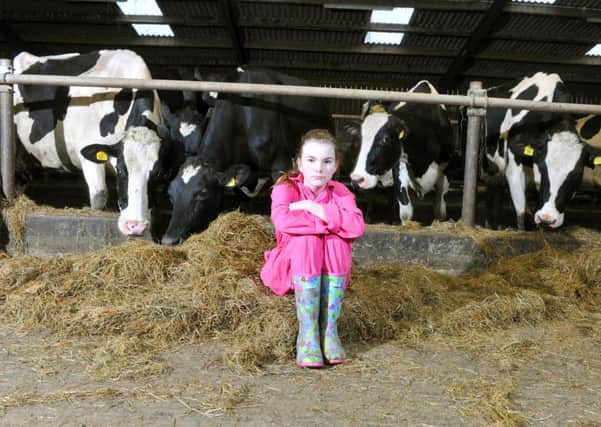Sarah Todd: Women in farming and their changing role


But such negative stereotypes need sweeping aside as Tuesday is International Women’s Day and the idea is for us to focus on the social, economic, cultural and political achievement of women.
It’s also about progress towards “gender parity”. Basically, closing the gaps – such as education and employment – between men and women.
Advertisement
Hide AdAdvertisement
Hide AdThere have been huge strides forward for women during this correspondent’s 25-plus years in journalism. There’s no doubt, looking back, that the first junior reporter job’s requirements were little more than looking reasonably pretty and being able to make a good cup of tea.
But enough of publishing, the industry – like seaside rock – stamped through my very being is farming.
There are diaries on the shelf behind me going back well over a century. There’s talk of breaking in cart horses, the Irish workers coming over to pick potatoes and acres of pages devoted to recording the weather.
They are all, incidentally, penned by the male heads of our family. Women are only mentioned in passing, such as “mother and I at church” and “the girls went into town”.
Advertisement
Hide AdAdvertisement
Hide AdThe fact that a career outside the industry of these ancestors beckoned is a good starting benchmark as to how much equality within farming has improved.
With an older brother, there was never any question of me working on the farm.
But nowadays, sisters and daughters are regularly taking the helm – look at the story this week about Abigail Morrell, the 11-year-old farmer’s daughter from Harrogate, who wrote to the Prime Minister about the state of the dairy industry because her ambition in life is to run a farm with her older brother who is studying agriculture at university. Good for her – and also for receiving such an encouraging response from David Cameron. More on milk prices later.
It always used to be thought that farming was too physical a job for women. But with advances in machinery – basically less shovel work and sack carrying – there are more females than ever before signing up to study at agricultural college.
Advertisement
Hide AdAdvertisement
Hide AdAs an aside, it would be wrong to pretend that farming isn’t still a hard, physical job. But just not quite as back-breaking as it once was in the days of digging ditches by hand.
Looking back at the life of my 97-year-old grandmother, a farmer’s daughter who married a farmer, her role was almost exclusively confined to the farmhouse.
There would be lads living in that needed breakfast and their washing doing. There would be other workers needing “drinkings”– taken out to the fields in the sort of enamel cans that yummy mummies now fawn over in shabby chic interior design shops.
Incidentally, it’s sad in my mind that family farms no longer have the same workforce.
Advertisement
Hide AdAdvertisement
Hide AdYes, mechanisation has transformed things – but it’s made modern farming quite an isolated job.
The aforementioned grandmother wasn’t involved in the farm in the way my own mother has been; running the gauntlet of ever-increasing record keeping to getting her wellies on and helping with anything and everything that needs doing out in the farmyard.
It has been women who have been behind many farm diversifications. Bed and breakfasts, holiday cottages, cheese and ice-cream making, farm shops, campsites and such-like.
Many starting off as nothing more than a little bit of pocket money but grew to become vital lifelines in the farm finances. In fact, it’s no exaggeration to say that these little enterprises that farmers’ wives set up have often proved to be the glue that has held family farms together.
Advertisement
Hide AdAdvertisement
Hide AdFemales in farming have often been quicker than their husbands and sons to stand up and campaign for the industry. Traditionally, farmers don’t like to make a fuss. They suffer in silence; hence the sad statistics of the suicide rate.
Two good examples are Women in Pigs and Ladies in Beef. Members can often be seen demonstrating recipes and answering questions about life on the farm and animal welfare.
During the current milk price scandal – the pittance being paid to dairy farmers compared to what the supermarkets are charging – it’s often been the women who have got the message across the best.
A recent survey by Farmers Weekly and Barclays Bank revealed how much the gender gap in farming has closed compared to a generation ago, with about two-thirds of women saying that they are treated “mostly” or “always” equally to men in terms of pay, benefits and daily work routines.
Advertisement
Hide AdAdvertisement
Hide AdReporting last year on a women in farming conference held at the Great Yorkshire Showground, it soon became plain that many women are the power behind the throne in agriculture.
Over the next decade or so, there can be no doubting that this will be turned on its head, with more girls moving up the ranks and taking over the actual throne.
Having said all this, they’ll doubtless still end up – like gran – doing the bulk of the work in the kitchen.
Some things will never change...
Sarah Todd is a former editor of Yorkshire Life magazine. She is a farmer’s daughter, mother and journalist specialising in country life.